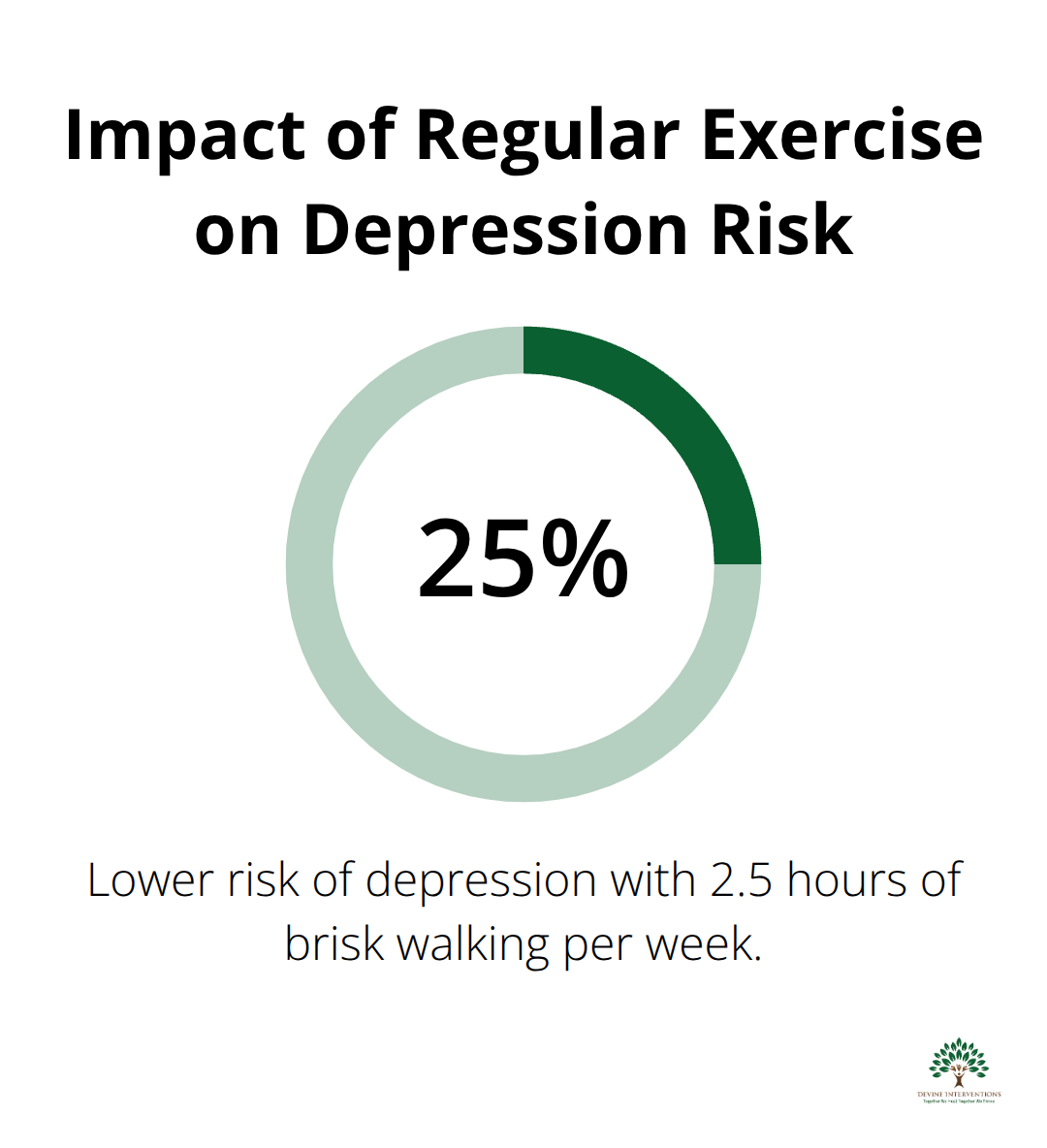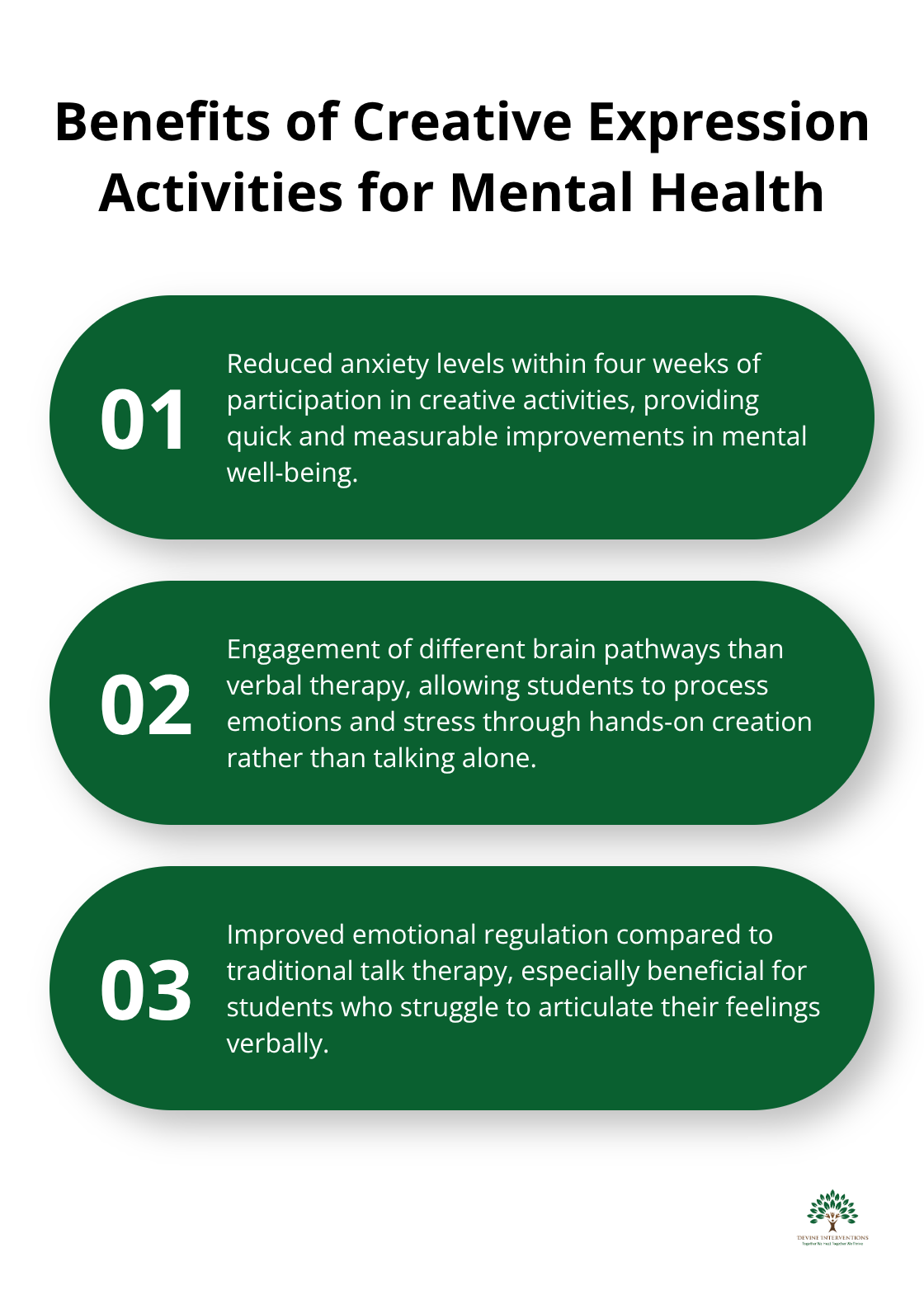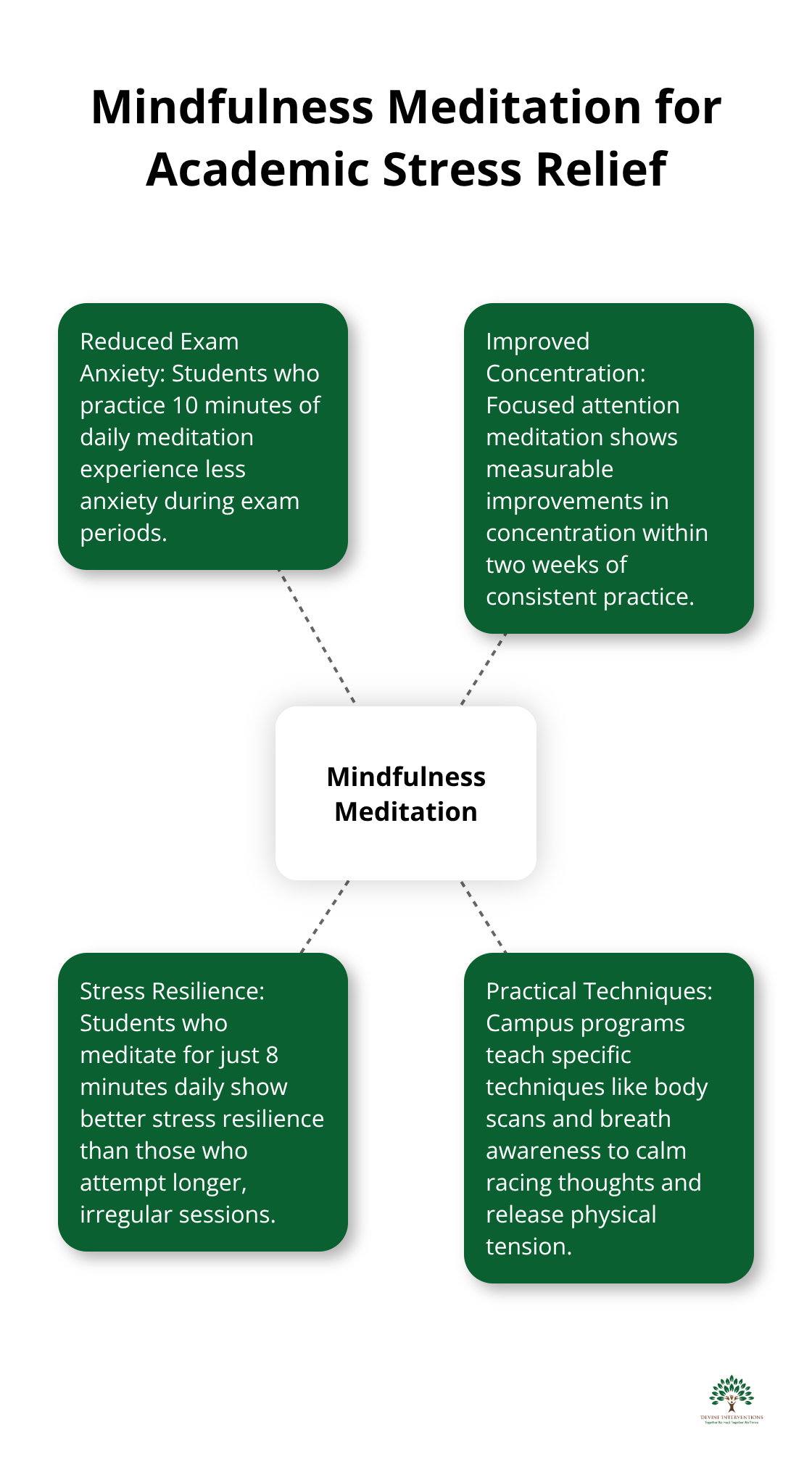College brings unique pressures that can overwhelm even the most prepared students. Academic demands, social transitions, and financial stress create a perfect storm for mental health challenges.
We at Devine Interventions understand that finding effective mental wellness activities for students shouldn’t add to your stress. Simple, accessible strategies can make a real difference in managing college life while protecting your wellbeing.
Physical Activities That Boost Mental Health
Physical exercise stands as the most powerful intervention for college mental health challenges, with research showing that accumulating an activity volume equivalent to 2.5 hours of brisk walking per week was associated with 25% lower risk of depression. Your campus recreation center offers immediate access to this proven treatment through structured fitness classes and equipment that costs nothing beyond your student fees. Group fitness classes like spin, kickboxing, and strength training provide built-in accountability while creating natural social connections that combat the isolation affecting 71% of college students.

Campus Recreation Centers Outperform Commercial Gyms
Most students avoid their recreation centers despite paying for access through fees. This mistake costs you both money and mental health benefits. Campus facilities offer specialized programs designed for student schedules, including early morning and late evening classes that accommodate packed academic calendars. The group fitness instructors understand student stress cycles and often incorporate stress-relief techniques into workouts. Many recreation centers also provide free personal training sessions and fitness assessments that help you build sustainable exercise habits without the intimidation factor of commercial gyms.
Outdoor Activities Deliver Superior Anxiety Relief
Nature-based activities and outdoor sports deliver superior mental health benefits compared to indoor exercise, with research showing that 90 minutes in nature reduces activity in brain regions associated with depression. Intramural sports like ultimate frisbee, soccer, and basketball combine physical activity with social interaction, addressing both exercise needs and the community connection that 44% of students report lacking. These activities require minimal skill levels and welcome beginners (making them accessible entry points for students who avoided sports in high school).
Movement-Based Stress Relief Provides Instant Results
Yoga and tai chi offer immediate stress relief that traditional workouts cannot match, with studies showing cortisol levels drop by 23% after just one session. Campus wellness centers typically offer free or low-cost yoga classes specifically designed for stressed students, focusing on poses that counteract hours of study time hunched over books and computers. These practices teach breathing techniques that work during exams and provide portable stress management tools you can use anywhere on campus when anxiety strikes.
The physical foundation you build through these activities creates the perfect platform for exploring creative outlets and social connections that further strengthen your mental wellness toolkit.
Creative and Social Engagement Opportunities
Creative expression workshops and art therapy programs deliver measurable mental health improvements that traditional counseling approaches often cannot match. Research shows that students who participate in creative expression activities report reduced anxiety levels within just four weeks. Campus art centers and student unions regularly host pottery classes, painting workshops, and creative writing sessions that cost nothing beyond your student fees. These activities work because they engage different brain pathways than verbal therapy, allowing students to process emotions and stress through hands-on creation rather than talking alone.

Art Therapy Workshops Transform Emotional Processing
Art therapy sessions on campus provide structured environments where students express complex emotions through visual creation rather than verbal communication. Students who attend weekly art therapy workshops show greater emotional regulation compared to those who rely solely on traditional talk therapy. Campus wellness centers typically offer these sessions in small groups of 6-8 students, creating intimate spaces where you can explore anxiety, depression, and academic stress through painting, drawing, and sculpture. The non-verbal nature of art therapy helps students who struggle to articulate their feelings in traditional counseling settings.
Peer Support Groups Create Lasting Recovery Networks
Mental health clubs and peer support groups on campus create accountability systems that individual counseling sessions cannot provide. Active Minds chapters exist on over 600 college campuses and connect students dealing with similar challenges through structured weekly meetings and crisis support networks. Students who participate in peer support groups show better treatment adherence rates compared to those receiving only individual therapy, according to the National Alliance on Mental Illness. These groups meet regularly in campus wellness centers and provide immediate access to people who understand your specific struggles without the formal appointment barriers of traditional counseling services.
Community Service Generates Immediate Mood Improvements
Volunteer activities generate immediate mood benefits through what researchers call helper’s high, with stress levels dropping after community service. Campus volunteer coordinators maintain databases of local opportunities specifically designed for student schedules, including weekend food bank shifts and tutoring programs that require minimal time commitments. Students who volunteer regularly report fewer depression symptoms and stronger campus connections compared to those focused solely on academics. Local animal shelters, literacy programs, and environmental cleanup projects provide structured ways to contribute while building social networks outside your academic bubble.
These creative and social connections prepare you to tackle the academic pressures that often trigger mental health challenges, setting the stage for developing practical strategies that address study stress and time management directly.
Academic and Personal Growth Strategies
Mindfulness meditation provides the most effective intervention for study stress, with research from Harvard Medical School showing that students who practice 10 minutes of daily meditation experience less anxiety during exam periods. Campus wellness centers offer free guided meditation sessions specifically designed for academic stress, typically scheduled between classes in quiet spaces away from library crowds. The key lies in consistency rather than duration – students who meditate for just 8 minutes daily show better stress resilience than those who attempt longer, irregular sessions. Apps like Headspace offer student discounts, but the most effective approach involves campus meditation groups where accountability partners help maintain daily practice.
Mindfulness Practices Target Study Stress Directly
Students who practice focused attention meditation show measurable improvements in concentration within two weeks of consistent practice. Campus meditation programs teach specific techniques for exam anxiety, including body scan methods that release physical tension and breath awareness practices that calm racing thoughts. These sessions typically run 20-30 minutes and accommodate students between classes (making them practical for packed schedules). The structured environment helps beginners learn proper techniques while providing community support that increases long-term adherence rates.

Time Management Eliminates Academic Overwhelm
Time blocking techniques outperform traditional to-do lists for college stress management, with students who use this method reporting reduced academic anxiety according to productivity research. The strategy involves assigning specific time slots to individual tasks rather than creating endless lists that increase overwhelm. Students should block 90-minute study sessions followed by 20-minute breaks, matching natural attention spans while preventing the mental fatigue that triggers anxiety episodes. Digital calendars work better than paper planners because they send automatic reminders and prevent the double-booking that creates panic.
Goal Setting Creates Mental Health Resilience
Weekly reflection sessions build emotional resilience more effectively than daily journaling, with students who conduct structured weekly reviews showing better stress management compared to those who journal sporadically. The process involves reviewing completed goals, identifying stress triggers from the past week, and adjusting upcoming plans based on energy levels and workload. Students should schedule these sessions for Sunday evenings, creating mental preparation for the upcoming week while processing emotions from recent challenges. This systematic approach prevents the emotional buildup that leads to anxiety attacks during midterms and finals.
Healthy Boundaries Protect Academic Performance
Students who establish clear study boundaries report significantly lower burnout rates compared to those who study without limits. Academic boundaries include designated study spaces, specific hours for coursework, and protected time for rest and social activities. The most effective approach involves creating physical separation between study areas and relaxation spaces (even in small dorm rooms). Students should also set communication boundaries with family and friends during study periods, reducing interruptions that fragment attention and increase stress levels.
Final Thoughts
These mental wellness activities for students provide immediate, accessible tools that address college stress without financial burden. Physical activities through campus recreation centers, creative workshops, peer support groups, and mindfulness practices work together to combat the multiple pressures that affect 73% of college students who find school overwhelming. Exercise reduces depression risk by 25%, art therapy improves emotional regulation within four weeks, and meditation decreases exam anxiety.
These strategies complement each other and create comprehensive support systems that address both immediate stress and long-term resilience. However, some situations require professional intervention beyond campus resources. When persistent anxiety interferes with daily activities, depression symptoms last more than two weeks, or academic performance suffers despite these strategies, specialized care becomes necessary.
We at Devine Interventions understand that college mental health challenges often require comprehensive treatment approaches (including therapy services and intensive outpatient programs). Our evidence-based treatments provide the clinical support that campus resources cannot offer. Your mental health deserves the same priority as your academic success – start with these accessible campus activities, but recognize when professional support can provide the specialized care needed for sustained wellness throughout your college experience.







